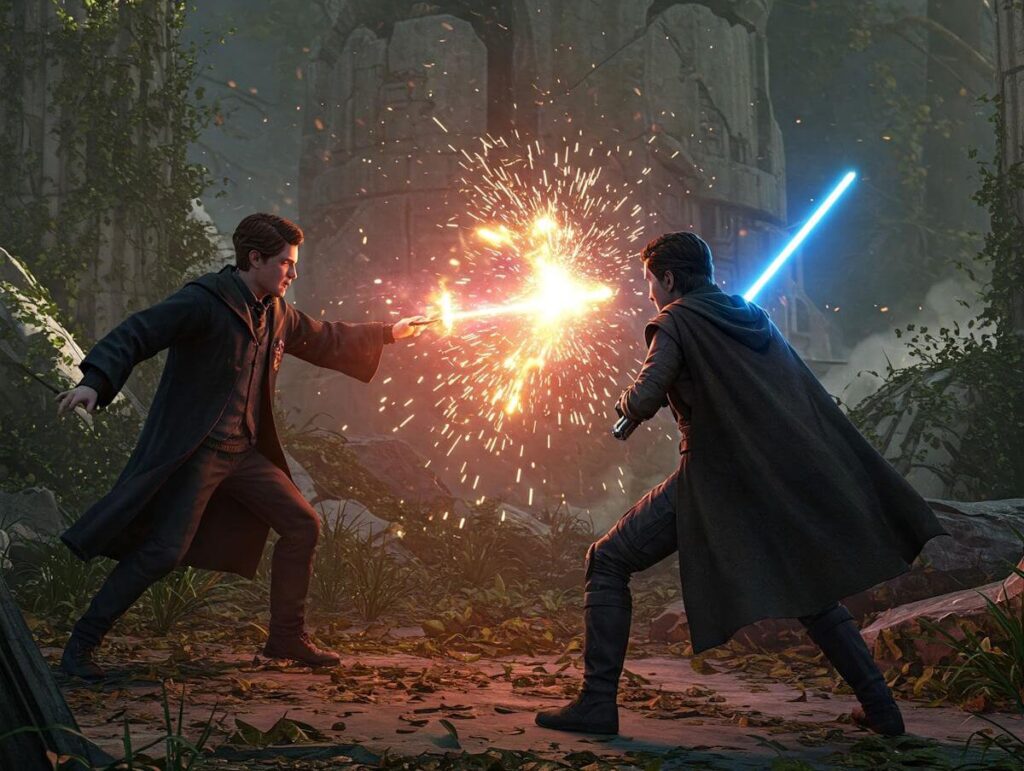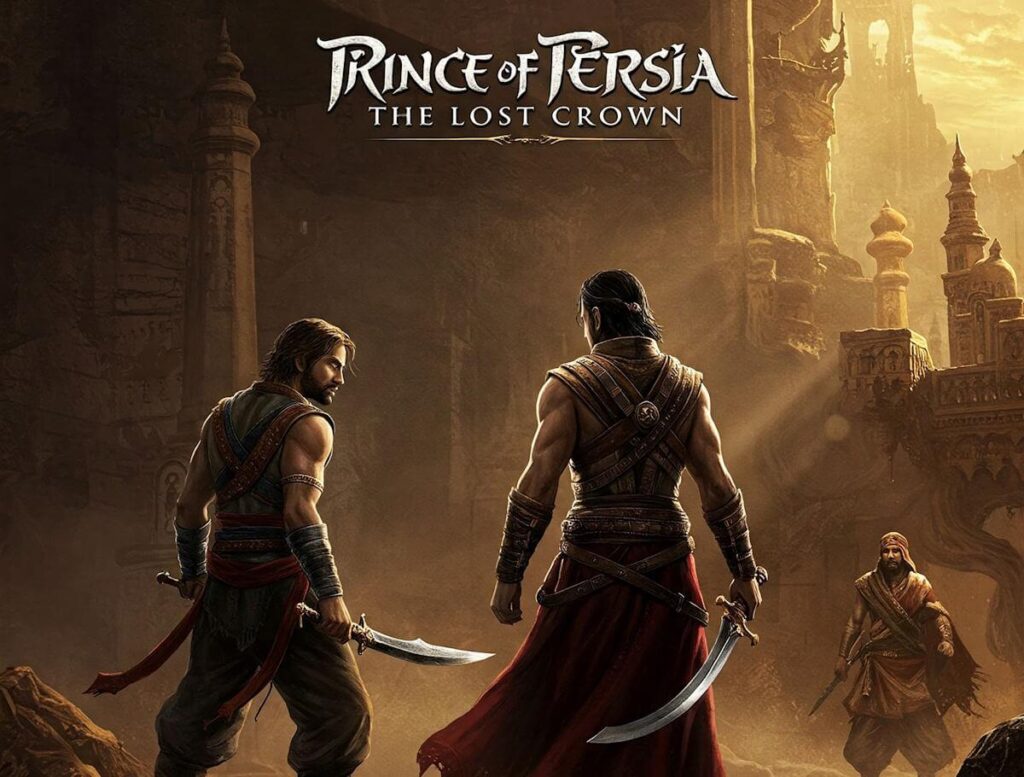In examining the enchanting realms of Hogwarts Legacy and the Star Wars Jedi series, it is imperative to understand the core magical systems that define each universe. Both franchises present unique interpretations of magic, influencing gameplay mechanics, narrative structures, and character development. In Hogwarts Legacy, players navigate the intricacies of wizardry as they attend Hogwarts School of Witchcraft and Wizardry. The game allows players to explore a richly detailed open world while honing their spellcasting abilities. Central to this experience is the use of various spells, each with specific effects and applications, from offensive charms to defensive enchantments. The aesthetics of magic in this universe are heavily inspired by British folklore, culminating in an immersive experience where players can feel the weight of their choices in every magical duel and potion-brewing session.
Conversely, the Star Wars Jedi series immerses players in the lore of the Force, a mystical energy binding the galaxy together. Here, magic manifests through the Force, which grants Jedi and Sith a range of abilities, from telekinesis to enhanced reflexes. The artistic style associated with the Force is deeply tied to themes of balance, light, and darkness, offering players an ethical dimension rarely seen in traditional magical systems. The combat in the Star Wars universe emphasizes lightsaber skills, combined with Force powers that create a distinct rhythm to gameplay. This dynamic interplay between physical combat and elemental manipulation enriches the overall experience, setting it apart from the more traditional spell-casting of Hogwarts Legacy.
As we delve deeper into the comparative elements of these two captivating realms, we can appreciate how each franchise interprets the concept of magic—whether through spells grounded in tradition or the ethereal pull of the Force. Thus, the ensuing sections will explore these magical elements further, delving into the strengths and limitations that they present to the players.
Hogwarts Legacy: The Wizarding World of Harry Potter
Hogwarts Legacy immerses players in the enchanting universe of J.K. Rowling’s Wizarding World, where magic permeates every facet of the gameplay. Set in the late 1800s, long before Harry Potter’s time, players take on the role of a student at Hogwarts School of Witchcraft and Wizardry, exploring an expansive open world filled with spellbinding challenges. The game brilliantly integrates iconic lore and elements from the original narrative, allowing players to dive into a rich tapestry of magical history and culture.
One of the core features of Hogwarts Legacy is its extensive array of spells, which players can learn and master throughout their journey. With spells ranging from the protective Shield Charm to the offensive Confringo, the mechanics encourage players to develop a strategic approach, utilizing the right spell at the right moment. Potions also play a crucial role, offering various benefits such as healing and enhanced abilities, thus further broadening the tactical opportunities during exploration and combat scenarios.
Another captivating aspect of the game is the multitude of magical creatures players can encounter. From familiar friends like hippogriffs to more elusive beasts such as thestrals, players can engage with these creatures through enchanting interactions that deepen their understanding of the magical ecosystem. The game’s attention to detail allows for a captivating experience, encouraging players to explore every corner of the Hogwarts grounds and surrounding areas.
With gameplay mechanics that emphasize choice and consequence, Hogwarts Legacy provides players with the freedom to select their path, be it a focus on combat, exploration, or spellcasting. The combination of spellcasting, potion-making, and creature encounters make for an immersive magical experience that truly captivates the essence of the Wizarding World. The level of engagement in the game not only enhances the magical experience but also appeals to fans of the franchise and newcomers alike.
Star Wars Jedi: The Force Awakens
The Star Wars universe presents the Force as a mystical energy that binds the galaxy together, influencing the lives of all beings within it. This omnipresent force holds a pivotal role in the narrative, particularly for Jedi characters who harness its power in various forms. The distinction within the Force is primarily between the Light Side, which promotes peace and understanding, and the Dark Side, often associated with aggression and selfishness. Jedi rely on their connection to the Light Side to explore numerous abilities that enhance their combat and strategic prowess.
In gameplay, the manipulation of the Force can manifest through a range of abilities. Common powers include telekinesis, which allows Jedi to move objects or even opponents; Force Speed, enabling enhanced agility; and Mind Trick, where the Jedi can influence the thoughts of others. Players often engage with these powers to overcome obstacles, solve puzzles, or gain advantage in combat, providing a dynamic gaming experience. Each ability requires a nuanced understanding of timing and energy management, reflecting a Jedi’s mastery over the Force.
Philosophically, the Force embodies deeper themes such as balance, sacrifice, and the eternal struggle between good and evil. The journey of a Jedi is not solely one of combat; it involves significant personal growth and ethical decision-making, shaped by interactions with the Force. Players are not only challenged to enhance their combat skills but are also encouraged to engage with the story’s moral complexities. This dual aspect of gameplay enriches the experience, compelling players to reflect on what it truly means to be a Jedi, further deepening their connection to the Force and enhancing character development throughout the game.
Comparative Analysis of Magical Abilities
In evaluating the magical abilities depicted in Hogwarts Legacy and the Force powers within Star Wars Jedi, it is essential to consider the context in which these abilities operate, along with their offensive, defensive, and supportive characteristics. Both titles offer a unique interpretation of magic, providing players with various methods to engage in combat and interact with their environments.
Hogwarts Legacy introduces an extensive range of spells drawn from the rich lore of the Harry Potter universe. Players can utilize offensive spells such as Expelliarmus and Stupefy to incapacitate foes, while defensive spells like Protego provide essential shields against incoming attacks. Additionally, supportive spells like Revelio enable players to uncover secrets and collect resources across the game world. The combination of these abilities allows for a versatile combat style, varying from direct confrontation to strategic evasions and explorations.
Conversely, Star Wars Jedi presents the Force as a pervasive, mystical energy that grants players an impressive array of powers. Offensive abilities include the use of Force Push and Force Pull, which not only damage enemies but also manipulate their positioning in combat. Defensive techniques, such as Force Slow, enable players to temporarily freeze foes, providing the opportunity to strategize. Furthermore, the game incorporates powers like Force Heal, emphasizing the supportive aspect of the Force, allowing players to recover health during battles.
While both games showcase exceptional magical abilities, their effectiveness can vary depending on the environment and the player’s approach. For example, in close-quarter encounters, the quick spellcasting of Hogwarts Legacy may prove advantageous, whereas the broader application of the Force in Star Wars Jedi allows for a more fluid interaction within expansive terrains. Ultimately, each system highlights unique strengths and weaknesses, enriching the overall gameplay experience.
Storytelling and Character Development
The narratives within both “Hogwarts Legacy” and “Star Wars Jedi” are intricately woven together with the threads of their respective magical frameworks, allowing for a unique exploration of storytelling and character development. In “Hogwarts Legacy,” the expansive world of magic is not simply a backdrop but a driving force behind the character arcs and plot progression. Players step into the shoes of a young wizard or witch, where the mastery of spells and magical creatures becomes emblematic of personal growth and transformation.
The presence of magic in this title allows for significant character choices that impact narrative outcomes. For example, a player’s decision to embrace dark magic can lead to unforeseen consequences, not just for the individual but also for their relationships with other characters. These elements work together to create a rich tapestry of emotional engagement, as players navigate friendships and rivalries within the Hogwarts setting. The transformative power of magic thus serves as a catalyst for character development, driving players to reflect on their moral choices and the relationships they cultivate throughout the journey.
On the other hand, “Star Wars Jedi” offers a different yet equally compelling portrayal of magic through the lens of the Force. The game delves into themes of redemption and conflict, which are enhanced by the magical elements present in the lore of the Star Wars universe. Characters such as Cal Kestis grapple with the weight of their power, often finding themselves at a crossroads that determines their path. The Force not only shapes abilities but also influences character relationships, making every decision resonate more profoundly within the expansive galaxy.
Both games utilize their respective magical frameworks to deepen emotional engagement and enhance player investment in character journeys. The intricate designs of these narratives illustrate how magic not only serves as a mechanism for gameplay but also enriches storytelling, making both “Hogwarts Legacy” and “Star Wars Jedi” memorable experiences that resonate with players on multiple levels.
Visual and Auditory Representation of Magic
In the realm of video games, the visual and auditory representation of magic plays a pivotal role in crafting an immersive experience. In both Hogwarts Legacy and Star Wars Jedi, the portrayal of magical abilities is distinctly unique, reflecting the rich lore and thematic elements inherent in each universe.
Hogwarts Legacy pays homage to the wizarding world, utilizing a vibrant color palette and intricate visual effects to depict spells. Each spell is carefully designed, showcasing swirling particles, luminous trails, and enchanting animations that enhance the illusion of magic at work. For instance, the fire spell emits fiery effects that dance realistically, while the levitation charm creates a shimmering aura around objects it lifts. The ambient lighting within Hogwarts itself further amplifies these effects, inviting players to fully engage with the magical environment. Coupled with this is an impressive sound design; magical incantations are accompanied by crisp sound effects that range from crackling electricity to the soft whispers of enchantment, establishing a palpable atmosphere that immerses players in the wizarding experience.
In contrast, Star Wars Jedi presents a more grounded approach to representing the Force and its associated abilities. The visual effects showcase a blend of high-tech and mystical elements, with lightsaber strikes producing vibrant, luminescent trails and Force abilities generating immersive visual cues. The aesthetic aligns with the franchise’s cinematic roots, as spells embodying the Force are depicted through explosive energy bursts or subtle waves that suggest control and mastery. The sound design also plays a crucial role, with iconic sound effects for lightsabers and the whispers of the Force enveloping the player in a familiar yet exhilarating auditory landscape. The synergy of visuals and sounds in both games not only signifies their respective magical systems but also enhances the overall gameplay experience.
Ultimately, while Hogwarts Legacy celebrates the whimsical charm of spells in a fantastical setting, Star Wars Jedi leans into a more action-oriented, cinematic representation of its magical elements. This divergence not only reflects their unique narratives but also elevates the immersion and enjoyment for players exploring each universe.
Community and Fandom Reactions
The launch of both Hogwarts Legacy and Star Wars Jedi has stirred enthusiastic reactions within their respective fandoms, particularly regarding the magical systems embedded in each title. Fans of the Harry Potter universe have expressed a nostalgic attachment to Hogwarts Legacy, praising its immersive representation of spells and magical environments. Players laud the game’s attention to detail in recreating the charm of Hogwarts and its surrounding areas, allowing them to experience the intricacies of spell casting in a manner that feels true to the beloved source material. The school setting, alongside the variety of spells available, encourages a sense of exploration and discovery that has resonated well with longtime fans of the series.
In contrast, Star Wars Jedi has garnered a different kind of admiration from the expansive Star Wars community. The game’s approach to “the Force” and lightsaber combat has elicited excitement among players who appreciate the deeper gaming experience afforded by the synthesis of action and strategic gameplay. Fans have noted that the skills learned and honed throughout the game reflect the journey of becoming a true Jedi, embodying lore and narrative elements from the films. Moreover, players have praised the seamless integration of Force abilities, which not only enhances combat but also promotes problem-solving within the game world.
Discussions on various social media platforms reveal that both fandoms value the autonomy offered in magical gameplay—whether it is mastering spells in Hogwarts Legacy or harnessing the Force in Star Wars Jedi. Many fans from both camps engage in comparative evaluations, highlighting how each game’s magic system complements its storyline while providing unique gameplay experiences. This dialogue invigorates each fandom, showcasing a healthy appreciation for how magic is interpreted in distinct yet celebrated ways within two iconic universes. Ultimately, the community response emphasizes a shared reverence for the magic that shapes these narrative-rich environments.
The Future of Magic in Gaming
The landscape of video games is continually evolving, and magical systems play a pivotal role in shaping player experiences. Two notable titles, Hogwarts Legacy and Star Wars Jedi, have set benchmarks that future games might aim to surpass. The innovations showcased by these titles hint at exciting developments on the horizon, providing rich ground for speculation about the future of magic in gaming.
In recent years, players have displayed a profound interest in immersive and interactive magical systems. Hogwarts Legacy has captivated audiences with its meticulously crafted world, allowing players to experience life as a student at the Hogwarts School of Witchcraft and Wizardry. Its spell-casting mechanics and character customization options have set a high standard, illustrating how engaging magical themes can drive player attachment to the narrative. Similarly, Star Wars Jedi has blended traditional combat with Force abilities to create a dynamic gameplay experience, merging storytelling and action in a way that is both thrilling and satisfying.
As we look toward the future, we can anticipate that developers will likely expand upon these successes, aiming to introduce even more intricate magical systems. Innovations could include enhanced spell interoperability, allowing players to combine powers or create new ones in real-time. This potential might not only refine gameplay but also deepen player engagement by encouraging experimentation and creative thinking in magical combat scenarios.
Moreover, with advancements in technology such as augmented and virtual reality, the experience of wielding magic could reach new heights. These tools could enable more immersive interactions with magical environments and characters. As the industry progresses, it is crucial for developers to embrace the essence of magic while drawing insights from prior successes, paving the way for enriched narratives, diverse magical mechanics, and unforgettable gaming experiences in new universes.
Conclusion: Who Reigns Supreme?
In analyzing the magical systems present in both Hogwarts Legacy and Star Wars Jedi, it is clear that each offers a unique approach to magic and combat, reflecting their respective narratives and gameplay experiences. Hogwarts Legacy, set in the richly detailed wizarding world of Harry Potter, provides players with a robust and varied set of magical abilities rooted in traditional spells, potion-making, and the enchanting practice of wand combat. This system allows players not only to engage in thrilling encounters but also to immerse themselves in the lore and heritage of the wizarding community, making spells more than just tools but integral components of the gaming experience.
On the other hand, Star Wars Jedi focuses on the Force and lightsaber combat, offering a different kind of magic that emphasizes the connection between the characters and the universe around them. The blending of lightsaber skills with the diverse powers of the Force leads to thrilling gameplay mechanics, where players can manipulate their environment and opponents in a dramatic fashion. The narrative underpinnings of the Jedi’s journey add depth, enriching the player’s experience as they navigate through moral dilemmas and the struggle between light and dark.
Ultimately, determining which magical system reigns supreme is subjective and hinges on personal preference. Players drawn to deep lore, spellcasting variety, and potion crafting may gravitate towards Hogwarts Legacy. In contrast, those who appreciate fast-paced combat and the philosophical undercurrents of the Force may find Star Wars Jedi more appealing. Both titles excel in their domains, offering valuable experiences tailored to distinct audiences. We invite readers to share their thoughts and experiences regarding which game and magical system resonated more, enriching the discussion surrounding these beloved franchises.




